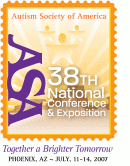 |
The ASA's 38th National Conference on Autism Spectrum Disorders (July 11-14, 2007) of ASAThe Westin Kierland Resort & Spa, Scottsdale, AZ |
| For a complete author index with session numbers, please click here | |
| Thursday, July 12, 2007: 1:15 PM-2:30 PM | |||
| Kirkland | |||
| #2807- Neurologic Music Therapy interventions and Autism* | |||
| Neurologic music therapy (NMT) is the research based treatment system for patients with neurologic disorders, including autism, and is based on utilizing the physiological mechanisms inherent in music perception and production. Treatment techniques are standardized for functional therapeutic outcomes. This session will outline NMT protocols used in the areas of cognition and speech/language that specifically apply to work with clients with autism and cite relevant research regarding NMT and the autistic population. | |||
| Presenter: | - Andrew Knight is a board-certified music therapist and a Fellow in the Robert F. Unkefer Academy of Neurologic Music Therapy (NMT) maintained at the Center for Biomedical Research in Music Therapy at Colorado State University. He has worked with children and adults with autism from the ages of 4 to 40 years old, and currently practices at the Milwaukee Center for Independence. He has presented at a variety of music therapy conferences at the state, regional, and national levels. His current research foci include NMT protocols addressing sensorimotor, cognition, and speech/language domains in a variety of populations with neurological disorders. | ||
|
| |||
|
Research literature reports that most individuals with autism respond positively to music. People with diagnoses on the autism spectrum often show a heightened interest and response to music, making it an excellent therapeutic tool to work with them. Music is a very basic human response, spanning all degrees of ability/disability. Music therapists are able to meet clients at their own levels and allow them to grow from there. The malleability of music makes it a medium that can be adapted to meet the needs of each individual. The structure and sensory input inherent in music help to establish response and role expectations, positive interactions, and organization. Individuals with diagnoses on the autism spectrum may display “qualitative impairments in social interaction and communication” and often manifest “restricted repetitive and stereotyped patterns of behavior, interests and activities.” Music therapy can be effective in addressing the typical characteristics of autism listed above in the ways listed below. Music therapy can stimulate clients to reduce negative and/or self-stimulatory responses and increase participation in more appropriate and socially acceptable ways. Music therapy can enable those without language to communicate, participate and express themselves non-verbally. Very often music therapy also assists in the development of verbal communication, speech, and language skills. The interpersonal timing and reciprocity in shared play, turn-taking, listening and responding to another person are augmented in music therapy with children and adults with autism to accommodate and address their styles of communication. Music therapy allows individuals with diagnoses on the autism spectrum the opportunity to develop identification and appropriate expression of their emotions. Because music is processed in both hemispheres of the brain, music can stimulate cognitive functioning and may be used for remediation of some speech/language skills. Music provides concrete, multi-sensory stimulation (auditory, visual, and tactile). The rhythmic component of music is very organizing for the sensory systems of individuals diagnosed with autism. As a result, auditory processing and other sensorimotor, perceptual/motor, gross and motor skills can be enhanced through music therapy. Many people with diagnoses on the autism spectrum have innate musical talents; thus, music therapy provides an opportunity for successful experiences. Emphasis is placed on strengths, which in turn may be utilized to address each individual's areas of need. Recently, the growing adaptation of brain research methods to the study of music cognition and perception has encouraged research into biomedical applications of music. New findings suggest that music can stimulate complex cognitive, affective, and sensorimotor processes in the brain, whose functions can be generalized and transferred to non-musical therapeutic purposes. Biomedical research in music concentrates, among others, on motor therapy, speech and language therapy, pain management, and cognitive rehabilitation in areas such as memory, executive function, and attention. A continuously expanding data base of research is beginning to move neurologic music therapy to the status of an evidence-based treatment modality. The shared parameters of vocal production between speech and singing also can be accessed to facilitate speech training in rehabilitation. Furthermore, the common communication components of signs and symbols as forms of meaningful expression in music and language can be used to support language development and the recovery of communication functions. A growing body of research suggests music may facilitate perception and organization of behavior in autistic children. Indeed, best practice is evidence-based practice, and protocols successful in treating individuals with autism and generalization to functional skills will advance the treatment of this disorder. Content that will be provided includes a brief overview of specific neurologic music therapy protocols applicable to work with clients with autism consisting of cognition (musical attention control training, auditory perception training, musical mnemonics training, and music sensory orientation training) and speech/language (symbolic communication through music, developmental speech and language training through music). Learning objectives include identifying the above NMT protocols, learning consultation procedures with a certified neurologic music therapist, co-treating procedures for affiliate professionals including speech/language pathologists, child psychologists, applied behavioral analysis therapists, and occupational therapists. |
|||
See more of General Submissions
See more of The ASA's 38th National Conference on Autism Spectrum Disorders (July 11-14, 2007)